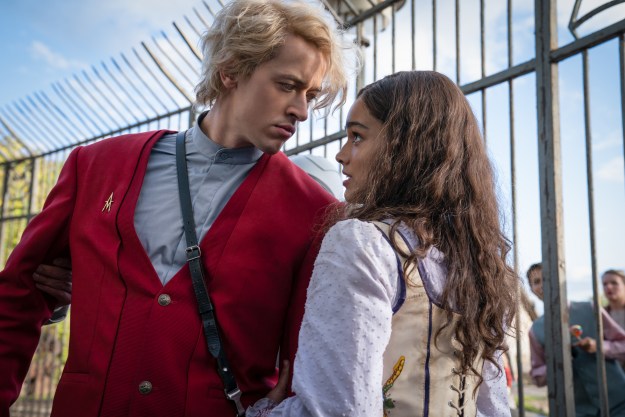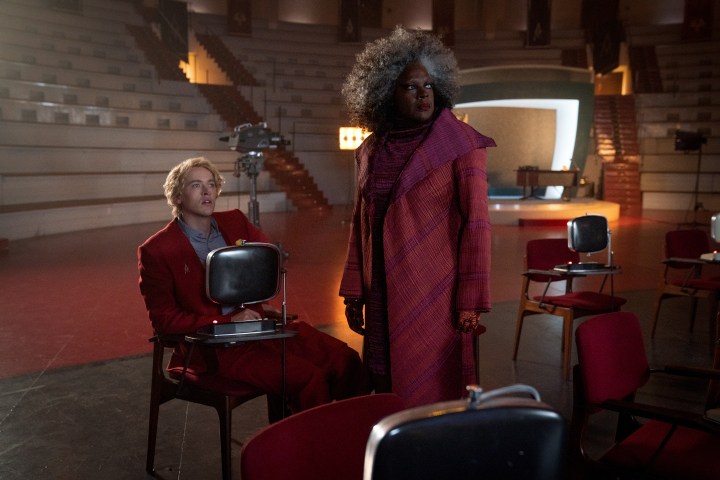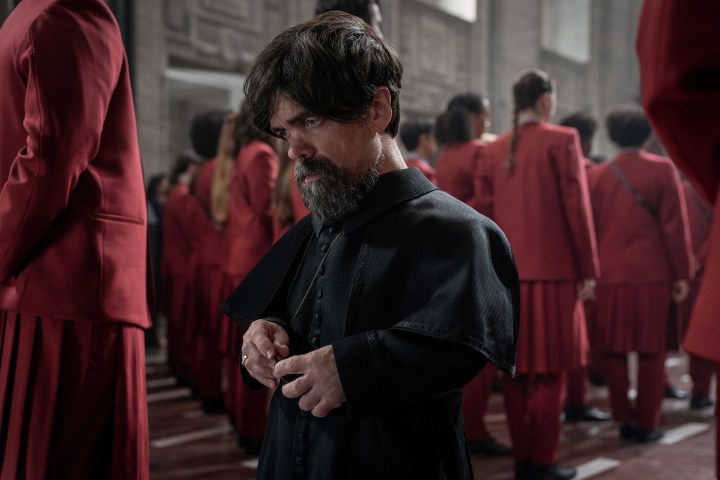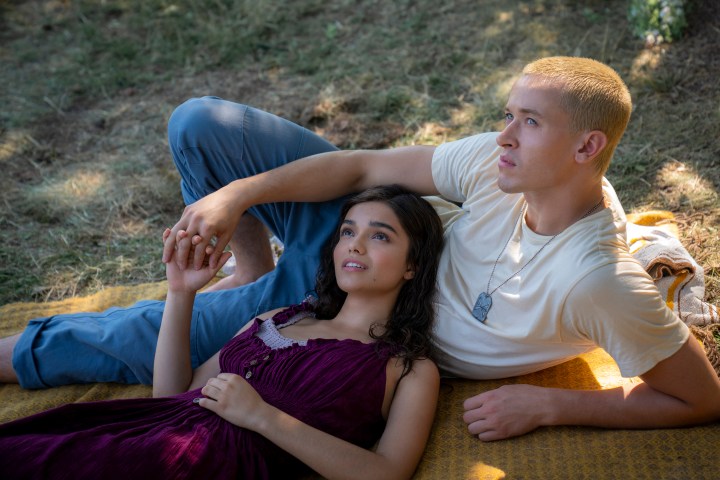
“While it runs a bit too long, The Hunger Games: The Ballad of Songbirds & Snakes is a satisfying prequel to a franchise many once believed was dead and gone.”
- Viola Davis, Peter Dinklage, and Jason Schwartzman's performances
- An engrossing, propulsive second act
- Francis Lawrence's visually impressive directorial approach
- An overly convoluted final third
- Unnecessary, unsatisfying romantic subplot between its two leads
- A runtime that's about 20 minutes too long
It’s been eight years since The Hunger Games: Mockingjay — Part 2 was released, and a lot has changed in the intervening years. That film, which was believed at the time to be its franchise’s final installment, was the product of the dystopian YA craze that partly defined the Hollywood of the 2010s. Nowadays, Hollywood is more reticent than it was in 2012 to try its hand at adapting popular YA book series, and most of the adaptations that are produced premiere as TV shows on streaming platforms like Netflix and Disney+.
That fact hasn’t stopped Lionsgate from trying to reignite viewers’ interest in its once-popular YA franchise with the release of The Hunger Games: The Ballad of Songbirds & Snakes this week. Is there still a place for The Hunger Games in today’s world? The answer may vary from person to person, even as The Hunger Games: The Ballad of Songbirds & Snakes proves that the franchise’s core ideas regarding the ever-present threat of totalitarianism are more relevant than they once were.
The film, an adaptation of Suzanne Collins’ 2020 novel of the same name, is a prequel that places its focus on the series’ central villain, Coriolanus Snow, and explores how the seeds for his reign over the fictional, dystopian nation of Panem were first planted. Directed by series veteran Francis Lawrence, the film is an overly long, frequently compelling dystopian drama. Over the course of its 157-minute runtime, the prequel takes its franchise to greater visual heights than ever before, but it ultimately adds little to the series’ already expansive treatise on the devastating cost of fascism.

Set around 60 years before the events of the original Hunger Games films, The Ballad of Songbirds & Snakes picks up with Snow (Tom Blyth), not when he’s a powerful politician, but much earlier in his life, when he’s the driven, impoverished young patriarch of a once-great family. When viewers meet him at the start of the movie, he’s determined to reclaim the wealth and power that his family had before his father died during a war between the Capitol and Panem’s outlying districts. His mission to climb up his nation’s social ranks is interrupted, however, when he and his fellow students are told that the winner of their potentially life-changing class prize won’t be determined by their academic scores, but by which of them manages to mine the greatest performance out of the current batch of Hunger Games tributes.
Much to his surprise and initial chagrin, Snow is assigned to mentor Lucy Gray Baird (Rachel Zegler), the latest female tribute from District 12 (the same district that produced Jennifer Lawrence’s Katniss Everdeen). Intent on turning her into a star, Snow advises her to not only perform as often as she can for the Capitol’s citizens, but also to use his knowledge of the year’s Hunger Games arena to survive the brutal battle royale. The more time they spend together, the more attracted to each other they become. At the same time, Snow finds himself increasingly willing and capable of using the merciless structure of Panem’s authoritarian society to his advantage.
Thus, The Ballad of Songbirds & Snakes is both an origin story for the Hunger Games’ greatest villain and an exploration of how easily one’s ambition can become a vessel for evil. For most of its runtime, the film succeeds at being both of those things. It does, however, begin to lose its grasp on its own story and pace once it moves into its second half, which relies on a handful of needlessly convoluted twists from Collins’ original novel. The film stretches on around 20 minutes longer than it should, and its script, penned by Michael Lesslie and Michael Arndt, holds on too tightly to the outline set by its source material. In its final third, the movie gets so lost in the intricacy of its own plot that the thematic weight of its climax is dulled a bit by the meandering path it takes to get there.

The Ballad of Songbirds & Snakes isn’t the first Hunger Games film to suffer from an overattachment to its source material. Fortunately, like the franchise’s first four installments, which were elevated by noteworthy supporting performances from accomplished stars like Stanley Tucci, Woody Harrelson, and Philip Seymour Hoffman, the prequel also benefits greatly from its vibrant, well-cast array of older characters. Widows and Suicide Squad star Viola Davis turns in a perfectly over-the-top performance as Dr. Volumnia Gaul, the Willy Wonka-esque head organizer and Gamemaker for the Hunger Games, while Peter Dinklage steals several scenes as Casca Highbottom, the inscrutable creator of the Games themselves. Jason Schwartzman also brings some much-needed, darkly comedic levity to the film as Lucretius Flickerman, a weatherman determined to turn the Hunger Games into a genuine spectacle.
Opposite them, Blyth and Zegler bring real charm to their dueling performances. Their scenes, however, suffer from a lack of chemistry between the two stars, which makes the romantic subplot involving their characters feel all the more superfluous. In its attempts to avoid painting Blyth’s future dictator in too endearing of a light, the film never fully commits one way or the other to his relationship. Is he legitimately attracted to her? Or is he solely using her for his own gain? The Ballad of Songbirds & Snakes tries to answer those questions as ambiguously as possible, but it never takes viewers deeply enough into Snow’s mind for that to work. The result is a muddled storyline involving young, easily corruptible love that doesn’t hit as hard as the rest of the film’s more acidic moments and ideas.

Behind the camera, returning Hunger Games director Francis Lawrence and his cinematographer, Jo Willems, shoot the entirety of The Ballad of Songbirds & Snakes with a mix of ultrawide lenses and full-frame IMAX cameras. In doing so, the pair frame each of the film’s characters as larger than life in a way that feels fitting for a movie that is so concerned with the insidiousness of not only authoritarianism itself, but also the propaganda that it tends to generate. It’s the most visually stunning Hunger Games movie to date — surpassing Lawrence’s Catching Fire, though, it never delivers a moment as satisfying as that film’s now-iconic IMAX transition.
Its various flaws prevent The Ballad of Songbirds & Snakes from ever becoming the truly great blockbuster that it had the potential to be. It doesn’t miss the mark of greatness too widely to completely write it off, either. In the grand scope of the Hunger Games franchise, it sits comfortably below Catching Fire as the series’ second-best film to date. Whether or not it provides a satisfying enough reason for it to exist may be entirely up to you, but it also doesn’t give anyone any excuse to resent that it does.
The Hunger Games: The Ballad of Songbirds & Snakes is now playing in theaters.
Editors' Recommendations
- The 10 best characters in the Hunger Games movies, ranked
- Fall 2023 movie guide
- The Hunger Games prequel The Ballad Of Songbirds and Snakes gets first trailer
- Who Invited Them review: mind games, murder, and mayhem



